December 18, 2013
Six Months in, four years later
“My mother didn’t tell me much about motherhood, it’s true. She said she couldn’t remember. None of you ever cried, she said vaguely, and then added that she might have got that wrong.” –Rachel Cusk, A Life’s Work
If I hadn’t written it down, I don’t think I would remember the blurry despair of Harriet’s early days. And even having written it down, the images are fractured. (Joan Didion: “You see I still have the scenes, but I no longer perceive myself among those present, no longer could even improvise the dialogue.”) For a while I’ve supposed that it was really not so bad, and that my tendency to dwell (through writing in particular) had magnified the difficulty and my impressions of my own unhappiness. I have thought this especially since Iris came along and we’ve been weathering all the usual bumps in the road. (“Oh yes, this is why we never wanted to have another baby,” we remembered the other night when once again Iris refused to go to sleep, which, while we meant it, was delivered cheerfully, as a joke.)
The must wonderful and terrible thing about having a blog are its archives. They are, quoting Didion again, “Paid passage back to the world out there.” Sometimes the passage is treacherous though, embarrassing, agonizing, that one person (myself!) could have been so stupid. But it is ever illuminating, these glimpses that remind one to keep in mind the unreliability of memory, the mutability of self.
I remembering telling someone that it was not until around seven months in to Harriet’s life that I was happy in our day-to-day life. (This is important. I am someone who is accustomed to being happy in my day-to-day life.) As time I went on, I started to doubt that this had really been the case, particularly because of how easy Iris has fitted into my life, how much I’m enjoying these days which are mostly spent with her napping on me while I read and write. Surely, I thought to myself, it couldn’t have gone on that long. There are photographs of us smiling. I have excellent memories of wonderful days.
But then I went back recently to read my archives about Harriet at six months, curiosity occasioned by Iris having just reached this milestone. There is a picture of me halfway up a ladder at a bookshop, and I so vividly remembered that day. Stuart had taken the day off and his company was so welcome, and I remembering feeling so fat, horrible, and tired, none of which I mentioned in the post (and I remember feeling quite surprised in fact when the photo wasn’t terrible). It was shocking to me that this had been six months along–I’d remembered it being so much sooner. But then time moved a whole lot slower then.
And then my post about Harriet at six-months, which was useful because it reminded me of her Baby Self who is now lost to us entirely (who sucked on her toes, loved the chicken puppet and had eaten the shopping list the week before).
This was followed by: ” It’s so hard. And I don’t think it ever gets easy, but it gets easier. And then harder too, of course, in all new ways, but the whole thing is also totally worth it in a way I’m really beginning to understand now. Only beginning to, though, because it’s an understanding I can’t articulate or even make sense of to myself, and it’s more a steady current inside of me than a feeling at all./ She is delightful, and fascinating, and amazing, and I can’t remember a world in which Harriet was not the centre. Which is not to say that sometimes I don’t wish for a different focus for a little while, but it would always comes back to her anyway. It always does. And it will forever, but how could it not?”
Confession: I now have no idea what I was talking about. Partly because the writing isn’t terribly clear or good, but mostly because “I no longer perceive myself among those present” in these scenes. Who was that woman anyway? Certainly nobody I’ve ever been.
Isn’t it funny that we persist in imagining time as a line, one thing after another, a cumulation. When it is something else entirely, and only the “now” is ever-present, the past itself gone with a poof out behind us and salvaged sometimes when made into a story.
November 18, 2013
Breastfeeding Carnival: Send in the Nipple Clowns
This post is part of the first Humor in Parenting (and Breastfeeding!) Blog Carnival inspired by the anthology Have Milk, Will Travel: Adventures in Breastfeeding, a collection edited by Rachel Epp Buller and published by Demeter Press in August 2013. The anthology looks at the lighter side of nursing. All of its contributors found something funny to say about their days as a non-stop milk shop, even if it was a tough job to have.
This carnival celebrates the craziness that is parenting and asks the question of how we use humor to get through our days, or minutes, or years. Just what’s so funny about being a parent? And why is it so important to make life with kids funny even when it doesn’t exactly seem hilarious?
Please share widely and connect us with other funny parents who are blogging and Tweeting. Use the hashtags #funnybreastfeeding and #humorcarnival along with whatever witty originals you come up with. Those ought to be worth some laughs, too!
See below for links to the other contributors. And, as you might have said to your nursling once upon a time, enjoy the buffet!
***
Two years ago, someone told Similac that I’d had a baby, even though I hadn’t, or at least not for some time. But regardless, a huge box was couriered to my doorstep containing cans of liquid formula and a great big tin of the powdered stuff. I was kind of outraged, committed breastfeeding mother that I am. My daughter had recently been weaned at 2.5 years, a peaceful end to a pretty lovely breastfeeding experience, and I’ve been trained to be wary of formula marketing schemes. All the same though, I put away that tin of powdered formula deep in the cupboard, supposing we’d have another baby someday. Everybody’s got a secret stash of something. And I wondered what I’d done to make Similac so confused. (Six months later and six months after that, I’d receive new packages from Similac congratulating me on my imaginary baby’s latest milestones, and including coupons for our next visit to Walt Disney World.)
**
Now imagine a montage, the comedy story of my breastfeeding life. Because breastfeeding comedy? I’ve known breastfeeding comedy. (Note: when you haven’t slept more than 3 hours in a row in 6 months, nothing and everything is funny.) Like when my baby was new and my breast was bigger than her head and she cried because it scared her. None of us blamed her.
This feature is shot on various locations, the first being at the zoo this summer as we sprinted toward the pandas in attempt to avoid the lineups, a jiggly shot from behind with my whole back exposed, me yelling at my four-year-old to hurry up. We got there, and the pandas were sleeping, of course, but at least we missed the lines. And the baby got fed.
All this flurry was so new to me. I never breastfed while mobile with my first baby, instead requiring soft-lighting, two pillows behind my back, a mid-range breastfeeding pillow, a good book and cup of tea in order to complete the transaction. This is also funny. Whereas with Baby 2, it’s not just at the zoo; I find myself breastfeeding on the subway while chaperoning a group of 15 children on a class trip. I’ve breastfed on a ferry boat, on a crowded streetcar, in the car while speeding down the highway.
**
But let’s go home now, back to the beginning for a shot of me and Baby 1, who at six weeks old decided that she would only feed without screaming if I rocked back and forth while nursing her. I don’t remember how long this went on. It was hard, and sometimes I spilled my tea, but we made do. I remember a Facebook conversation at the time with someone who suggested that if breastfeeding weren’t easy, we were doing it wrong, and how I laughed and laughed. Comedy gold. Zoom in next on my mother’s anxious face as I tried to feed the screaming baby around the same time. “Maybe you don’t have enough milk?” she suggests, to which I respond by squeezing my breast, milk shooting across the room. “I don’t know,” I replied. “What do you think?” Not so secretly delighted because I’d been dying to pull off such a stunt for ages.
It is possible that the second-greatest pleasure of my breastfeeding life has come from horrifying people. This was a huge draw to breastfeeding my first baby into toddlerhood. We even had a plan, my husband and I. We were going to pump like mad with Baby 2 so that I could have a life of my own and also so that we could make breast-milk ice cream. We were going to make breast-milk ice cream so that we could eat breast-milk ice cream, but moreover so we could tell certain people that we had eaten breast-milk ice cream. “It was delicious,” we imagined reporting. “We flavoured it with mango.”
Unfortunately, that part of the movie never got made. The breast-pump we borrowed was fourth-hand, and the motor didn’t work. We tried it twice and it sounded like a dying cow, and so we pulled out the manual pump instead. Not so much for the ice-cream now, but because I had this fantasy of leaving the house for two hours when the baby was nine weeks old. But just as had been my experience with the first baby, I pumped and pumped and nothing came out. My midwife had suggested that perhaps I try pumping while not reading a novel. “You have to be thinking about your baby,” she said, but I didn’t understand that. In my mind, there was a direct correlation between lactating and reading and I didn’t want to know how to do the one without the other.
Desperate times though–we figured out a way to make it work. Picture this: during one Sunday in August, every time the baby fed (which was often), my husband would hook the manual pump to the breast she wasn’t feeding on and he would pump until his hand cramped. And how that milk would flow. He ended up with carpal tunnel, but we managed to fill an entire bottle, and I even got a couple of chapters read, though it was awkward to hold my book with him there.
Of course, when I went out, the baby wanted none of it. This is when the scene transitions from comedy to horror. All that effort was poured right down the drain, and then we put the manual pump away too, the way we always did, and consented to use formula instead when I went out by myself. As though we had control over any of this. I still had that tin of Similac left over from my imaginary baby. My actual baby, however, was as uninterested in the formula as she was the pumped milk, so now I just go out and she cries a lot.
Life is a compromise.
It is terrible and exciting that she starts solids in two weeks.
***
Please check out these the other submissions to our humor carnival:
In “I Will Sleep When I’m Dead,” Zoie at TouchstoneZ needs some sleep but her kids have other ideas.
In “Laugh or looney bin,” Virginia of Ready or Not Mom shares how laughter (and tears) got her and her husband through two NICU stays and a whole lot more. “Just call me Bessie…on the move” shows some love for a nursing mom without a lot of spare time on her hands.
In “Boobs Are in the House,” Jenny of Half Crunchy Mom shares how her love affair with her nursing breasts was hindered only by the act of pumping, but she found a way to party with the pump.
In “Send in the Nipple Clowns,” Kerry of Pickle Me This shares a story in which a mother who hasn’t slept more than three hours in a row for six months reflects back on the comedy of her breastfeeding life.
And, from Have Milk contributors:
In “The importance of laughter,” Jessica Claire Haney of Crunchy-Chewy Mama gets serious about looking for humor with her kids where her own parents didn’t.
In “Underwater” and “Excuse Me,” Adriann Cocker of Cockerchat muses on the absurdity of parenting while leading a hip loft lifestyle
in downtown Los Angeles.
***
To learn more about Have Milk, Will Travel, or to buy a copy for your favorite mom (or the people who love her), visit the Have Milk page at Demeter Press or on Amazon.
See how much Literary Mama liked the book at this review.
Keep up with readings and happenings on Facebook at https://www.facebook.com/HaveMilkWillTravel and follow the book’s feed on Twitter at @HaveMilkTravel.
November 7, 2013
On the Unbearable Uselessness of Mother Wisdom
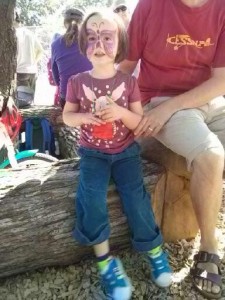 My daughter Harriet is four, and she is a lot like me, except that she’s grown up in the city instead of the suburbs and she goes to the museum once a week. For someone who is four, she has some excellent ideas about where to get the best pastries in our neighbourhood. One day she’ll use chopsticks, but for now, she eats her sushi with a fork.
My daughter Harriet is four, and she is a lot like me, except that she’s grown up in the city instead of the suburbs and she goes to the museum once a week. For someone who is four, she has some excellent ideas about where to get the best pastries in our neighbourhood. One day she’ll use chopsticks, but for now, she eats her sushi with a fork.
Which is to say that I am enamoured of her worldliness, and I’d like to think that between the two of us, we have this life thing figured out.
My illusion slips though when I glimpse the parts of her that are just a little too familiar. I observe the awkward ritual of her eating a cupcake. I catch her being unkind to a younger classmate. I see her making all the missteps I’ve spent most of my life learning to avoid.
***
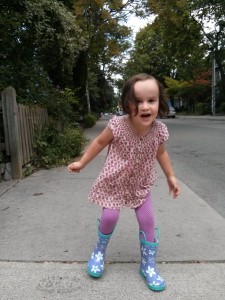 It took me 25 years to learn not to leave dirty dishes piled in the sink. Which sounds like a lesson that’s awfully mundane, but it isn’t. First of all, because it made me the kind of person who doesn’t leave dirty dishes piled in the sink, which is useful. And also because it taught me the pleasures of a chore all done, the loveliness of a small window in my life in which there are no dishes to do. When there’s a job, get it done, is what it took me a quarter of a century to figure out, and this is just one of the things that I know.
It took me 25 years to learn not to leave dirty dishes piled in the sink. Which sounds like a lesson that’s awfully mundane, but it isn’t. First of all, because it made me the kind of person who doesn’t leave dirty dishes piled in the sink, which is useful. And also because it taught me the pleasures of a chore all done, the loveliness of a small window in my life in which there are no dishes to do. When there’s a job, get it done, is what it took me a quarter of a century to figure out, and this is just one of the things that I know.
I know that cupcakes are most delicious when I don’t lick the cream off first. This is also true of Oreos. I know that making my bed in the morning will improve the experience of going to bed tenfold. I know that I have to be the change I wish to see in the world, and that kindness is a subtle force, but one that’s powerful. That if something’s difficult, it’s all the more reason to try it. That fear is not an exemption from bravery. I even know how to eat an ice cream cone without it dripping down my shirt. Most of the time.
I know that books are the key to the universe. That after every winter comes a spring. That if I try it, I just might like it. That being loud is not the same as being heard. That if I take care of things, they last longer, and if I put them away, I know where to find them. I know that cheap shoes will leave a legacy of ruined feet. And if I’m going to eat a cookie, I better make sure that it’s a good one.
***
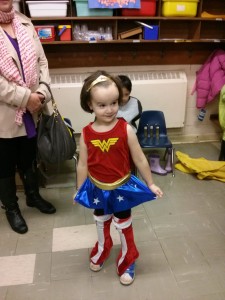 Let us imagine a conversation with my daughter. The one where I tell her, “I learned all my lessons so you won’t have to.” And she says, “Thanks, Mom,” my ever-grateful beneficiary. She will always get her homework done before dinner. She takes care of her teeth. She will seek out vulnerable classmates and befriend them. She never ever asks, “Are we there yet?” because she knows that whining doesn’t make a journey go faster, and she was born knowing that boredom is a kind of personality defect.
Let us imagine a conversation with my daughter. The one where I tell her, “I learned all my lessons so you won’t have to.” And she says, “Thanks, Mom,” my ever-grateful beneficiary. She will always get her homework done before dinner. She takes care of her teeth. She will seek out vulnerable classmates and befriend them. She never ever asks, “Are we there yet?” because she knows that whining doesn’t make a journey go faster, and she was born knowing that boredom is a kind of personality defect.
I am not completely a fool. I know that parents more experienced than I are reading this now and thinking, “Just you wait, lady…” My little daughter is only four and the stakes are cupcakes and whining; this is just the beginning. And it’s what lies ahead that is totally terrifying.
I think of other things I’ve figured out by now. Important things like how not to get hit by busses when crossing the street. How not to get a stupid tattoo. I know how not to get pregnant. I know how not to get so drunk that I’m left unconscious and therefore, in the minds of some, a fair target for rape. I’ve gotten quite good at figuring out how not to get my heart broken. I learned how not to give myself away, how to keep friends, and how to appreciate my own company. I fell in love with a man who knows he is lucky to be loved by me. I can drive a car without crashing. I know how to be secure in myself without having to whittle away at the self-esteem of another. These are lessons, some of them, that have been a long time coming.
**
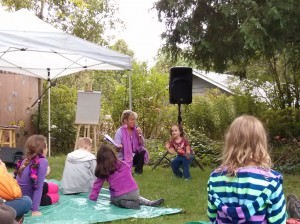 From exposure to a multitude of terrible cliches, I’ve known all along that part of being a parent is letting our children go, letting them fly, setting them free. It’s a lesson that’s easier to know in theory than in practice, but I still understand it as a necessary component of the mother trade.
From exposure to a multitude of terrible cliches, I’ve known all along that part of being a parent is letting our children go, letting them fly, setting them free. It’s a lesson that’s easier to know in theory than in practice, but I still understand it as a necessary component of the mother trade.
And it’s a really romantic idea, at least when you choose not to think about Icarus. Instead, soaring eagles and everything. But what I never understood are the inherent risks of flying, that our children aren’t always going to soar. I didn’t realize that part of being a parent is also giving our children the freedom to plummet back to earth.
So far, being a mother has been one long continuing education, and the greatest revelation has been this: it is unfair to expect my daughter to immediately impart a lesson that I took 25 years to learn. From my daughter’s perspective, all my hard-won mother wisdom is utterly useless. No matter how many times I tell her all the things that I know, she’s still going to have to figure them out for herself.
***
I am watching Harriet in the playground, besotted with the big girls who have no time for her, following them around and seeming not to notice when they don’t respond to her bossy instructions for playing. The girls are playing with Barbies, and now she wants one too, never mind my lectures about their distorted bodies and deformed high-heel feet. Another group of kids is playing soccer, but Harriet doesn’t want to play with them, no matter my feminist imperative that girls can do anything. “I’m not good at running,” she says, which is actually true, because when has an apple ever fallen far from its tree? If Harriet had a sink, her dirty dishes might be piled to the ceiling.
But she is four. This is what I have to remember. What I keep telling myself. It would be a tragedy if she had it all figured out, and it would also make me quite redundant in the role of her mother.
As it is, however, she needs me. Not to have all the answers, but to stay close-by as she makes her own way. It’s my job to give her space, to let her fall, and to help pick up the pieces, if need be.
It’s my job to love her as she is, a work-in-progress just like the rest of us.
This essay was written in August. Mercifully, Harriet has not since mentioned wanting a Barbie.
October 27, 2013
Happiness Threads: The Unborn Poems by Melanie Dennis Unrau
 Motherhood gets written about so often, I think, because we’re all trying to articulate the inexplicable. Edging closer and closer to the point, but never quite getting there, putting the most abstract, complex emotions and feelings into words. But poetry gets close to capturing the subtleties, in its smallness and delicateness, hovering just inches about how it is. I am thinking of Susan Holbrook’s poem “Nursery” from Joy Is So Exhausting, the workings of a mind through nursing marathons, as the baby moves from left to right and back again: “Left: Now that you’ve started solids, applesauce in your eyebrows, I’ve become a course. Right: Spider on the plastic space mobile, walking the perimeter of the yellow crescent moon. Left: Dollop. Right: Now it’s on Saturn’s rights; if it fell off, it would drop right into my mouth.” I am thinking about Sweet Devilry by Yi-Mei Tsiang.
Motherhood gets written about so often, I think, because we’re all trying to articulate the inexplicable. Edging closer and closer to the point, but never quite getting there, putting the most abstract, complex emotions and feelings into words. But poetry gets close to capturing the subtleties, in its smallness and delicateness, hovering just inches about how it is. I am thinking of Susan Holbrook’s poem “Nursery” from Joy Is So Exhausting, the workings of a mind through nursing marathons, as the baby moves from left to right and back again: “Left: Now that you’ve started solids, applesauce in your eyebrows, I’ve become a course. Right: Spider on the plastic space mobile, walking the perimeter of the yellow crescent moon. Left: Dollop. Right: Now it’s on Saturn’s rights; if it fell off, it would drop right into my mouth.” I am thinking about Sweet Devilry by Yi-Mei Tsiang.
And now The Happiness Threads: The Unborn Poems by Melanie Dennis Unrau, which is a collection of poems about making art and making babies, about birth and loss, and about the very strange community that is the online forum. The collection begins with a poem called “my children are not my poetry”: “a mother’s job is to know/ what matters and keep it alive/ a poet’s job is to feel/for a pulse…”
The first section is a series of poems about a miscarriage,a frank and raw exploration of the physical and emotional experiences of it. Of how death amd birth go hand in hand. The second section is about pregnancy, though it seems to be that it’s here that saying these poems are “about” anything becomes a little too simplistic. These poems are curious, puzzling, their imagery not literal and challenging our expectations, surprising us. These poems are pregnancy and motherhood are written with the first section of the book in mind, with an awareness that motherhood has its own dark side of the moon, that it’s love with an outline of pain. This poet knows what the stakes are by now. “the womb is… a nightmare nine months/ of falling no idea what it is/ to land.”
The third section is about birth and babies, though the poem “reclining buddha” contrasts the story of my life (“when you come to my bed with your/ whimpers and needs/ bird mouth searching for my breast/ i know i will hold you the rest of the night/ cup your bald head/ in my hands soft…”) with the story of a Cambodian mother whose grown soldier son returns home to spend a night in bed with her as he had as a child. “another birth story” sets the experience of a woman finding and losing herself through the birth of her child against the language of feminism, women’s studies and academia.
And then “happiness threads”, poems inspired by communication on an internet baby-wearing forum, with all the inane abbreviations that occur in such places. These poems include a glossary, which is telling, I think, how motherhood necessitates a whole new language near unintelligible to the rest of the world. Here, Dennis Unrau captures the shattered nature of a new mother’s existence, these conversational threads written in the dead of night, presumably as baby nurses. And the reader charts the evolution of this mothers experience, as she finds her feet, finds new challenges, redefines herself as a mother over and over again and the world never really does become steady. I love the idea of threads, especially in light of Solnit’s The Faraway Nearby, and thinking about these women on the internet in the middle of the night and all their literary antecedents thread-wise.
And then section five is “love poems”, whatever is left for the margins, conversation once the dishes are cleared and the kids are in bed. “don’t touch me i growl/ end of a day of cluster feeding/ your need does not move me.” Poems about the people we’ve come from. And then “Holiday”, which is so lovely, celebrating one’s partner in the chaos of it all:
your lullabies and page-turns are white
noise
i sink
into a book notice later the music
stopped you asleep together
map in one hand
a flashlight beam on a slack
cheek a moving eyelid
XX
Read an interview with Melanie Dennis Unrau at the Jane Day Reader.
September 18, 2013
Sometimes Love Isn’t a Let-Down
 “I just never thought it would be like this.”
“I just never thought it would be like this.”
This is a line from an essay I wrote a few years ago, an essay whose title and central metaphor was a reference to breastfeeding: “Love is a Let-Down”. The literal let-down though had been the unhappiness I’d experienced during those difficult weeks after my first daughter was born. Not postpartum depression, a label sometimes too broadly applied whose tidiness undermines the fact that becoming a mother is really hard, that new moms are often insufficiently supported, that babies are a lot of work, and the learning curve in those early days can seem impossibly steep. I still maintain that my unhappiness in those days didn’t necessarily mean there was anything wrong with me.
But oh, was my transition to motherhood ever a bumpy one. I didn’t even have breastfeeding problems, and I was having breastfeeding problems. Baby’s latch was fine, my milk was plentiful, and somehow she still managed to lose (or I managed to lose her?) 11% of her body weight, a terrifying ratio for someone so small. I’m not big on mother-guilt, but that 11% is seared upon my brain. It meant that everything in those early days seemed so fraught, perilous. I’d been handed this enormous responsibility and was already doing it wrong just four days in.
Precisely two things would save my breastfeeding life (and allow it to continue for the next two and a half years). The first was my midwife’s gentle care the first day we were home from the hospital after my c-section. “Breastfeeding takes time,” she told me as she helped me with positioning. “And patience,” she said, as we woke up the baby who’d once again fallen asleep on the nipple. And suddenly it became clear to me that this was really going to be work, at least for a while.
 But not so much work, and here we come to the second thing that saved my breastfeeding life. The lactation consultant who took a mother-centric view of my situation and determined I didn’t need to be up all night long while my baby suckled away with an excellent latch I was loath to break considering the recent fact of her 11% weight loss. Quite unfashionably, at least in some breastfeeding circles, the consultant weighed my daughter before and after her feed, and took in the fact of my copious milk supply. “She gets everything she needs in five to ten minutes,” she told me. I would be free to cut off the feed when I saw fit, and so for the next week I did, and my daughter still gained weight. It began to occur to me that I may have had some mothering instincts after all.
But not so much work, and here we come to the second thing that saved my breastfeeding life. The lactation consultant who took a mother-centric view of my situation and determined I didn’t need to be up all night long while my baby suckled away with an excellent latch I was loath to break considering the recent fact of her 11% weight loss. Quite unfashionably, at least in some breastfeeding circles, the consultant weighed my daughter before and after her feed, and took in the fact of my copious milk supply. “She gets everything she needs in five to ten minutes,” she told me. I would be free to cut off the feed when I saw fit, and so for the next week I did, and my daughter still gained weight. It began to occur to me that I may have had some mothering instincts after all.
“Love is a Let-down” I wrote in my essay, because my milk letting down was something I was never able to feel—at least not until it had leaked all over my shirt. In fact, I wasn’t able to feel anything the way I thought I should have, love in particular, certainly not in the ecstatic manner supposed by the rows of congratulatory cards on my window-sill. (“I just never thought it would be like this.”)
But what I eventually learned was that in those early days, love was doing instead of feeling. Love was every time I changed a diaper with tears streaming down my face, every time night turned into morning while the baby screamed, those early evening walks through our neighbourhood with the baby asleep in her carrier, a tiny, gentle reprieve.
It is a bit of a mystery though, how I went from that desperate woman crying over the change table to being somebody who was pregnant again. On purpose, even! Part of it was that four years had passed, and while the vividness of my newborn memories hadn’t faded, I’d had time to get over the trauma. I’d also always known I’d want a second child, which had underlined all my despair the first time: that I’d one day have to do it all over again. And while I was quite conscious that having another baby would come with its own challenges, I’d learned a thing or two the first time and I was hoping that what I’d learned would prove worthwhile.
 When my second daughter was born in June, I didn’t dare to imagine that we were prepared, but we had bought a queen-size bed so we could sleep comfortably with her, I had paid a woman $200 to made capsules out of my placenta in an effort to combat the baby blues, and my husband had taken 3 months off work to ensure that when I cried over the change table, I’d never cry alone.
When my second daughter was born in June, I didn’t dare to imagine that we were prepared, but we had bought a queen-size bed so we could sleep comfortably with her, I had paid a woman $200 to made capsules out of my placenta in an effort to combat the baby blues, and my husband had taken 3 months off work to ensure that when I cried over the change table, I’d never cry alone.
And much to my surprise, relief and pleasure, these measures worked miracles. More, this time I was not so lost in new motherhood—I recognized the landmarks, was accustomed to the topography. It was so strange to encounter this world again, but this time not to be out of my mind.
“I just never thought it would like this.”
Because this time, everything was different, except the parts that were the same, but these were more easily weathered when I was feeling supported and strong. And the best thing of all, which no doubt paved the way for my easier experience—from the time she was forty minutes old and I was lying in the recovery room, immobile from my repeat c-section, my new baby breastfed like a champion.
As her new life began to be measured in days and then weeks, I kept waiting for the hiccups (metaphoric ones), for inevitable bumps in the breastfeeding road, but they never arrived. I never knew how much weight she lost after birth because the number never mattered. She was back to birth weight at one week old, and the road has been smooth ever since then.
 So these were my two experiences, shockingly disparate and I am one woman, suggesting a remarkable diversity in the experiences of new motherhood for women everywhere. If I’d had my second experience first time around, I’d have no idea what women were talking about when they talked about difficulty breastfeeding, though I would imagine that I understood. There was a part of me before that just assumed that having a newborn was as terrible for everyone as it had been for me, and that anyone who said otherwise was lying. So often, we might think we’re talking about the very same things, but they aren’t actually the same things at all.
So these were my two experiences, shockingly disparate and I am one woman, suggesting a remarkable diversity in the experiences of new motherhood for women everywhere. If I’d had my second experience first time around, I’d have no idea what women were talking about when they talked about difficulty breastfeeding, though I would imagine that I understood. There was a part of me before that just assumed that having a newborn was as terrible for everyone as it had been for me, and that anyone who said otherwise was lying. So often, we might think we’re talking about the very same things, but they aren’t actually the same things at all.
 It’s been a revolution, I think, they way we tell our stories now, and not just in hushed tones over coffee in suburban kitchens, but in print and out loud. But while I realize how important it is that these stories are being told, I also recognize something useless in this endeavour. I understand now how unhelpful was so much of the advice I offered to (or rather forced upon) friends who had babies not long after I did. I remember pronouncing like a sage that no one ever need wake a sleeping baby to feed, not considering matters of milk supply, for example. I feel a twinge of regret when I consider the women I might have terrified with “Love is a Let-Down”, women who might have imagined that my experiences would necessarily be their own.
It’s been a revolution, I think, they way we tell our stories now, and not just in hushed tones over coffee in suburban kitchens, but in print and out loud. But while I realize how important it is that these stories are being told, I also recognize something useless in this endeavour. I understand now how unhelpful was so much of the advice I offered to (or rather forced upon) friends who had babies not long after I did. I remember pronouncing like a sage that no one ever need wake a sleeping baby to feed, not considering matters of milk supply, for example. I feel a twinge of regret when I consider the women I might have terrified with “Love is a Let-Down”, women who might have imagined that my experiences would necessarily be their own.
So I think what we have to keep in mind as we’re sharing our stories is that stories are stories instead of facts or even destinies. That “I just never thought it would be like this” isn’t always a bad thing. The great thing about stories is that sometimes you get to write your own. That love is a let-down, and then sometimes it isn’t after all.
(From my presentation at last Friday’s launch of the anthology Have Milk Will Travel: Adventures in Breastfeeding by Rachel Epp Buller)
September 10, 2013
Caution Against Any Recipe for Perfect Children
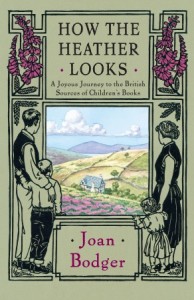 “I caution against any recipe for perfect children or for perfect families.” –Joan Bodger, “Afterword”, How the Heather Looks
“I caution against any recipe for perfect children or for perfect families.” –Joan Bodger, “Afterword”, How the Heather Looks
How the Heather Looks is one of my favourite books about parenting and children’s literature, mostly for the wisdom contained in its Afterword. On a surface level, the book itself is really an incredible primer on the lengths parents can go to to make books come alive for their children, as well as a splendid introduction to so many kid-lit classics. But if you didn’t read Bodger’s Afterword, or her extraordinary memoir The Crack in the Teacup, you might imagine that the idyllic 1950s’ family depicted in her book was her reality. Instead we learn that even limitless exposure to the greatest books ever written cannot keep trouble from darkening one’s doors. For some of us, that’s a difficult lesson to learn.
I’m thinking about this now as we’re struggling at our house with an unexpected and really difficult adjustment to kindergarten. I totally thought that we’d gotten off scot-free because Harriet has been in schooling for a year now, and has loved her play-school experience so much. When she began play-school last year, she shed nary and tear and ran along to play like she’d been there always, and I secretly thought that this was a reflection of her character and resilience, as well as my own infinite wisdom as a parent for enrolling her in schooling when the time was right, and for preparing her so well to be in the world. But the last few days have been a hearty Ha! to that idea.
Living a life is so difficult, and loving someone little who is making their way can be so gut-punchingly horrible. You can never be prepared for that, or prepare that little one for everything she might encounter. There is no recipe for a perfect childhood, and while I’d like to wrap the world in cotton-wool, I can’t, so instead I will keep on reminding myself that just loving her so hard is enough,
July 5, 2013
One Whole Month of Iris
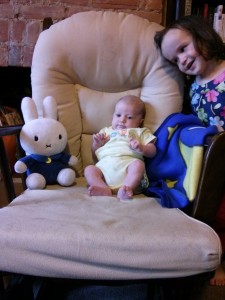 When I wrote “Love is a Let-Down”, the point was not to say that new motherhood is necessarily a terrible experience, but instead to underline how different it is for everyone. That for many of us, the experience didn’t align with the greeting card slogans. We’re not over-the-moon but instead completely overwhelmed by a world that has been shattered into pieces and put back together in a still-broken state. And now I worry that in my current state of mind I’m letting down the team a little bit, undermining the message of those who’ve dared to speak honestly about what it is to become a mother. But then again, I’m really not undermining it at all, but instead underlining my main point which is that every woman comes to motherhood in her own way. Because this time, with my second baby, the experience has been everything it wasn’t first time around. I’ve become a walking greeting-card slogan myself—“Everything is going really well!” If I wasn’t living it, I’d be convinced I was lying.
When I wrote “Love is a Let-Down”, the point was not to say that new motherhood is necessarily a terrible experience, but instead to underline how different it is for everyone. That for many of us, the experience didn’t align with the greeting card slogans. We’re not over-the-moon but instead completely overwhelmed by a world that has been shattered into pieces and put back together in a still-broken state. And now I worry that in my current state of mind I’m letting down the team a little bit, undermining the message of those who’ve dared to speak honestly about what it is to become a mother. But then again, I’m really not undermining it at all, but instead underlining my main point which is that every woman comes to motherhood in her own way. Because this time, with my second baby, the experience has been everything it wasn’t first time around. I’ve become a walking greeting-card slogan myself—“Everything is going really well!” If I wasn’t living it, I’d be convinced I was lying.
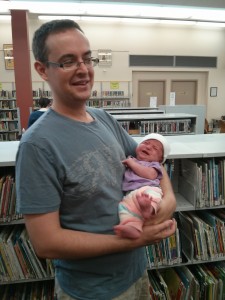 Of course, anyone who’s ever had a second baby will tell you that this is what happens. They told me, actually, but I didn’t believe them, or else I certainly didn’t believe that it could be possible for someone like me who was so notoriously terrible at new motherhood. That this time you know what you’re doing, you learn to ride the chaos instead of thinking you’re doing it wrong, that it all goes by faster and you really do try to enjoy every minute.
Of course, anyone who’s ever had a second baby will tell you that this is what happens. They told me, actually, but I didn’t believe them, or else I certainly didn’t believe that it could be possible for someone like me who was so notoriously terrible at new motherhood. That this time you know what you’re doing, you learn to ride the chaos instead of thinking you’re doing it wrong, that it all goes by faster and you really do try to enjoy every minute.
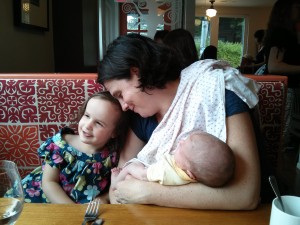 It is a different experience altogether. That first baby requires “becoming a mother”, which comes less naturally to some of us than others. I’m reminded of the trauma undergone by astronauts when they re-enter the earth’s atmosphere–my experience was the emotional equivalent of that. But this time, I’m a mother already and there is no becoming necessary. There is none of the shattering, the loss of self that was so terrifying to experience. I am fundamentally unchanged by the birth of Iris, except that our family is a different shape and the world is just a little bit bigger.
It is a different experience altogether. That first baby requires “becoming a mother”, which comes less naturally to some of us than others. I’m reminded of the trauma undergone by astronauts when they re-enter the earth’s atmosphere–my experience was the emotional equivalent of that. But this time, I’m a mother already and there is no becoming necessary. There is none of the shattering, the loss of self that was so terrifying to experience. I am fundamentally unchanged by the birth of Iris, except that our family is a different shape and the world is just a little bit bigger.
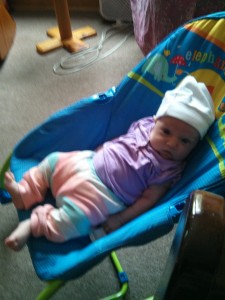 Motherhood is a storm, is the quote by Laurie Colwin that I seized on, the metaphor that so clearly articulated what I was going through. But it’s not been stormy this time. Instead, I’d say it’s been like a summer’s day, albeit one sometimes experienced from my bed but with the patio door wide open and the sun pouring in. The baby is screaming, her face so red that I’m reminded of a cartoon character with smoke coming out its ears, but this is funny instead of traumatic. I’ve got living proof asleep in a bedroom downstairs that this wretched, squalling foetal creature is in fact going to grow into an actual human being. And so that’s how one becomes a greeting-card slogan, all consumed by how fast the days are flying by and by the smell of the baby’s head.
Motherhood is a storm, is the quote by Laurie Colwin that I seized on, the metaphor that so clearly articulated what I was going through. But it’s not been stormy this time. Instead, I’d say it’s been like a summer’s day, albeit one sometimes experienced from my bed but with the patio door wide open and the sun pouring in. The baby is screaming, her face so red that I’m reminded of a cartoon character with smoke coming out its ears, but this is funny instead of traumatic. I’ve got living proof asleep in a bedroom downstairs that this wretched, squalling foetal creature is in fact going to grow into an actual human being. And so that’s how one becomes a greeting-card slogan, all consumed by how fast the days are flying by and by the smell of the baby’s head.
It has been a good month. My husband has been a huge part of this. Whereas the early days of Harriet challenged our relationship like nothing else, we have been so kind to one another since Iris arrived. That he is able to be on parental leave means that the hardships weigh more equally on both of our shoulders. He has taken extraordinarily good care of me during my recovery. And as I’ve recovered, we have had fun together, with Harriet too when she wasn’t yelling at us. (We now understand why people enroll their children in camp all summer long.) And now that I am nearly recovered, a brilliant summer lies before us. It’s all more graspable than I dared to imagine it was.
We went out for lunch today (of course) to celebrate a month of Iris, and to toast to the three of us for so successfully weathering the last few weeks. And now Harriet’s asleep and Iris is squawking downstairs, so I must go down to feed her, but while I do, we’ll be watching The Hour, which is so so good, and this nightly television thing is the most excellent ritual. Previously, we’d both worked in the evenings and TV was a treat saved for Friday nights (with wine) but now every night is Friday night, and how can you fault a life like that? It might as well be July. And it actually is.
Iris is gorgeous when she sleeps, slightly weird looking awake, and entirely beloved by every member of her family. Her most remarkable attribute was that she was born with a tooth. We are curious about who she’s going to grow to be, but we love her already. She looks a bit like her sister, but more like her self, and a little bit like me who also had ginger eyebrows as a baby. She is usually asleep or calm when people meet her, undermining her reputation as a miserable person. She likes to sleep in my bed in my armpit, which is a bit counter to what the safe-sleep advocates say, but I guess we like to sleep dangerous. I think we’re safe though, because she doesn’t really sleep that much. She took a soother once, and I was overjoyed, but hasn’t done it after. Since her birth a month ago, she’s gained two whole pounds, which is amazing. She gazes at Harriet like she looks at no one else, though I’ve gazed at Harriet myself so I can’t say I blame her. Her mouth is beautiful. She also likes to fall asleep on people’s chests, and she’s not yet discriminating about whose. Her belly button is shaped like an @ sign. She screams a lot and hates most things, but still manages to be adorable. And there is not really much else one can say when describing someone her age, but we’re so excited to get to know more and more about her.
June 20, 2013
A lesson about post-partum reading
I have learned a very important lesson about post-partum reading, which is that long books are anathema to the cause. I’ve been reading I Capture the Castle for days and days, and while I’m enjoying it enough, I’m making such slow and discouraging progress. I think that fast and short books are probably best for those of us who only have time to read with baby at the breast (and even with that, are usually joined by older sibling who wishes to poke baby in the cranium as she feeds, which is certainly enough to distract one from a book). Not least because the smaller books are easier to hold with one hand, but also because they give the illusion of productivity, action, time well-spent. “There,” I can say, setting another snappy book aside, “is something I’ve accomplished.” The opposite of reading a long book, or growing a baby for that matter. I require more immediate satisfaction that either activity can provide, I think. The latter one being particularly unrewarding, you see; though my efforts, my baby packed on 10 oz last week, but every person who glimpses her can only exclaim, “She’s so tiny!”
June 8, 2013
How Iris arrived
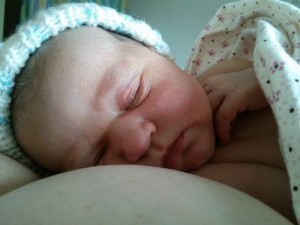 It really was a very gentle time, the weeks we spent waiting for Iris to come. I spent last Friday evening bouncing on a ball to induce labour, made absolutely miserable, and then my husband discovered that if you bounced on a birthing ball to terrible hiphop ballads, the whole experience was made more fun. Though looking back, I realize it was probably for the best that my labour was not brought on by bouncing to Usher singing Love in this Club. And I absolutely adore the photo of me in my bathing suit from last week, the gloriousness of it all, though it’s all sort of bittersweet when I compare that image to my poor ravaged body today.
It really was a very gentle time, the weeks we spent waiting for Iris to come. I spent last Friday evening bouncing on a ball to induce labour, made absolutely miserable, and then my husband discovered that if you bounced on a birthing ball to terrible hiphop ballads, the whole experience was made more fun. Though looking back, I realize it was probably for the best that my labour was not brought on by bouncing to Usher singing Love in this Club. And I absolutely adore the photo of me in my bathing suit from last week, the gloriousness of it all, though it’s all sort of bittersweet when I compare that image to my poor ravaged body today.
Here it is: I am so so happy. I know I am only four days postpartum, and probably hormones have something to do with the happiness as well, but they’re supposed to. “I never imagined it could be like this,” but this means something very different now. And I know the experience of my birth, although it was far from ideal, really has something to do with this. Oh, how much it matters how the baby arrives. I know this for sure now, but in a more nuanced way than when I was ranting a few weeks back.
My labour began on Sunday night after we’d eaten much of Barbara Pym’s Victoria Sponge, although it was not apparent to me that it was labour until Monday around noon. I spent Monday night awake every ten minutes with contractions, but then by morning they were gone. A visit to the midwives on Tuesday showed that things had been progressing, even without the contractions. They started again Tuesday night with a great deal of trouble on my behalf, and we were up all night again, sure that this was it. The midwives arrived with birthing supplies and found me dilated to 6 cm. But the contractions never got stronger and once again were gone in the morning. The midwives came later that morning with the intention of breaking my water, but then the baby’s heart-rate was troubling–she was not responsive enough. And while she was stable, it was scary, and there was no longer very much natural about my “natural” birth. I just wanted the baby out.
We took a cab to the hospital, both of us crying–partly because we knew our birth plans were out the window, because we were scared for the baby, and also because we knew we were leaving Harriet without having prepared her for this. (She was at school at the time, would be cared for by our wonderful friend Erin until my mom arrived to stay with her here.) It was cold and grey outside, and as we drove past a high school, a group of boys threw rocks at our car. The world seemed quite horrible and we kept crying–I have never seen a taxi driver more concerned about his fares (and so maybe the world was not so horrible after all).
En-route to the hospital, I started having contractions again, which continued as we waited in triage. The OB on-call found it odd that someone dilated 6cm was not progressing, and give me the option of induction, which I had no intention of taking. (“It’s going to need a lot of drugs to work,” she said, again, a far cry from natural.) But still, that she give me a choice made the decision to do a repeat c-section one that I could own, and I am grateful for that. Which is not to say that I wasn’t weeping in the OR, so much so that the staff was confused–never had a sadder woman been about to give birth. Situation compounded by an anaesthesiologist who I think forgot I was a human being as she handled my body pre-surgery. The student midwife came over to comfort me with casual conversation though–I think she said, “So what’s the first thing you’re going to eat when you can eat again?” And obviously, the answer was chocolate croissants, and seriously, that woman changed my world around. By the time Stuart was brought in in his scrubs, I was comforted and ready, and knew we had made the best and only choice.
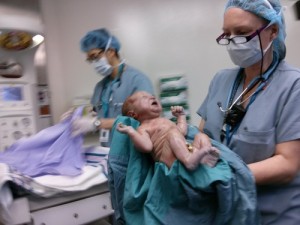 Iris means rainbow, and Malala is a hero. The midwives knew how troubled I’d been having never seen Harriet until she was wrapped and hatted when she was born, and so when they pulled her out and brought her to the warming bed, I knew just where to look and Stuart snapped a photo. She was amazing, purple, and she was mine, ours. I knew it instantly. Because of Harriet, there is a part of my heart that is mother-love now, and Iris resided there immediately. I cried and cried, like I’ve cried just one time before, at the birth of Iris’s sister. Our girl was finally here. Our family was complete. It meant something that we’d been waiting so hard for her, that I had been supported so much in my intentions for VBAC, and that Iris herself had been trying as hard to come to us–they discovered the cord was wrapped around her neck four times and there was no way she would have made it out on her own, and an induction would have been a disaster.
Iris means rainbow, and Malala is a hero. The midwives knew how troubled I’d been having never seen Harriet until she was wrapped and hatted when she was born, and so when they pulled her out and brought her to the warming bed, I knew just where to look and Stuart snapped a photo. She was amazing, purple, and she was mine, ours. I knew it instantly. Because of Harriet, there is a part of my heart that is mother-love now, and Iris resided there immediately. I cried and cried, like I’ve cried just one time before, at the birth of Iris’s sister. Our girl was finally here. Our family was complete. It meant something that we’d been waiting so hard for her, that I had been supported so much in my intentions for VBAC, and that Iris herself had been trying as hard to come to us–they discovered the cord was wrapped around her neck four times and there was no way she would have made it out on her own, and an induction would have been a disaster.
They didn’t lie, all those people who told me it would be different the second time around. That first night as Iris fed all night long, Stuart having to deliver her from one side to another as I was unable to move, I didn’t sit there wishing we could leave her and run away. I knew already that the objective to such a night wasn’t getting the baby to sleep, that the baby was doing nothing but simply being a baby. The goal of the night, I knew, was to get through it as best we could, which we did, aided by the fact that Iris has breastfed like a champion since being 40 minutes old.
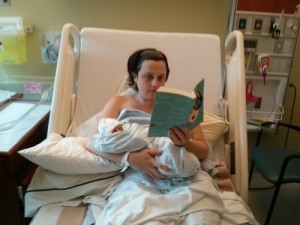 We left the hospital yesterday–turns out they can boot you out after 2 days now, which is kind of unbelievable, but we were good to go, and eager to get home to Harriet. The surgery has left me brutalized–I think my surgeon 4 years ago was a master of the art, because I was out for walks last time and today I can barely move. Midwives have assured me that my previous experience was the exception to the rule. And I hate that, feeling so badly, but it’s also not so bad being confined to my bed. I’m reading Where’d You Go, Bernadette, which I love. Stuart is bringing me snacks and meals. We prepared for all of this by buying a queen-sized bed last winter, which is so comfortable, and I also got a smart phone a few weeks ago, knowing it would make this kind of thing easier, still being connected to the world. The postpartum crazies also have yet to arrive–they were knocking at the door last night, but then were followed by the woman I’ve paid to make capsules of my placenta, which are meant to help balance hormones. She dropped off the pills, I started taking them, and I’ve been feeling cool ever since. No weeping even! Maybe it will all kick in tomorrow, but in the meantime, I’m happy to take good days where I find them.
We left the hospital yesterday–turns out they can boot you out after 2 days now, which is kind of unbelievable, but we were good to go, and eager to get home to Harriet. The surgery has left me brutalized–I think my surgeon 4 years ago was a master of the art, because I was out for walks last time and today I can barely move. Midwives have assured me that my previous experience was the exception to the rule. And I hate that, feeling so badly, but it’s also not so bad being confined to my bed. I’m reading Where’d You Go, Bernadette, which I love. Stuart is bringing me snacks and meals. We prepared for all of this by buying a queen-sized bed last winter, which is so comfortable, and I also got a smart phone a few weeks ago, knowing it would make this kind of thing easier, still being connected to the world. The postpartum crazies also have yet to arrive–they were knocking at the door last night, but then were followed by the woman I’ve paid to make capsules of my placenta, which are meant to help balance hormones. She dropped off the pills, I started taking them, and I’ve been feeling cool ever since. No weeping even! Maybe it will all kick in tomorrow, but in the meantime, I’m happy to take good days where I find them.
Iris, as we know her so far, is marvellous. She arrived and looked like an elderly frog, the next day like a dinosaur, but now she just looks like Harriet did, but with fairer colouring. She practices smiling in her sleep, and midwives reported today that she’s doing great. Her mood could be assisted by the fact that her mother is not a lunatic. She’s just three ounces down from birth weight and we no longer need to wake to feed! Because of my previous experience, when Harriet lost so much weight, I’ve been breastfeeding with great persistence (which is not so heroic–Iris is content to let me read while doing this) and it seems to have paid off. It’s so good to be home and Stuart is taking such good care of me. Harriet is the big sister beyond my wildest dreams, her bond with Iris already making us swoon, and she is displaying such annoying and atrocious behaviour in addition to this that we know she is in fact fully processing the change in our family and we won’t have to wait for another shoe to drop.
 So there it is. Everything is wonderful. Just four days in, and I know you have to take good times one day at a time just like the trying ones, but it really means something. Four days postpartum with Harriet I was in pieces already. I was so scared to go through all this over again, and I am so relieved and grateful that this is different. That the gentle times continue. Knock wood, of course, and there will be challenges ahead, but I’m pleased that there really is a chance that I’ll be strong enough to meet them.
So there it is. Everything is wonderful. Just four days in, and I know you have to take good times one day at a time just like the trying ones, but it really means something. Four days postpartum with Harriet I was in pieces already. I was so scared to go through all this over again, and I am so relieved and grateful that this is different. That the gentle times continue. Knock wood, of course, and there will be challenges ahead, but I’m pleased that there really is a chance that I’ll be strong enough to meet them.
And thank you to so many friends for support and best wishes. We are a very lucky family.
May 30, 2013
Remembering Dr. Morgentaler
I do wonder if Baby is hanging on inside partly in order for me to be able to address the life and legacy of Dr. Henry Morgentaler from the point of view of one who has more business thinking and opining on reproductive freedom than any other–a woman with a fetus growing inside her. Though of course we don’t call our baby a fetus, and our fetus/baby is so old (41 weeks!) that she’s actually enrolling at university next week. But it’s true that I never spend more time thinking about abortion rights than when I’m pregnant, particularly because the first time I was ever pregnant, a long time ago, it was access to abortion than handed me my life back. And I don’t know that I was ever more grateful for that as when I finally became a mother years later, on my own terms, on terms that were good and healthy and setting me up for success as a mother, a partner, as a member of a family–as a person, even. For me, the choices I’ve made as a mother and the choice to end my first pregnancy have always gone hand-in-hand, the keys to life as I know it, life as I chose it. And oddly, it was Morgentaler himself who performed my abortion way back when–it has been suggested to me that I hallucinated this happening, and it all was a very heady, blurry time, but I promise it was so. And so upon his death, I remember him as a hero who fought to give Canadian women ownership of their own bodies, but also as a doctor who helped me when I was desperate and everything seemed so dark. Without him, that desperation could have taken me somewhere where I would have been in much deeper trouble. Today I, along with so many other Canadian women who keep quieter about these things, am grateful for his courage.






